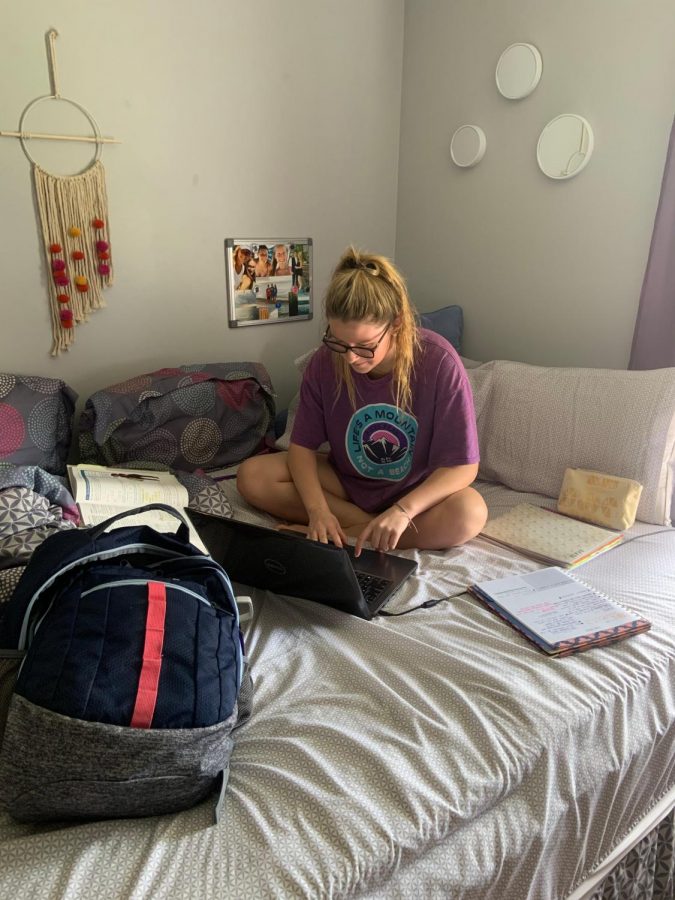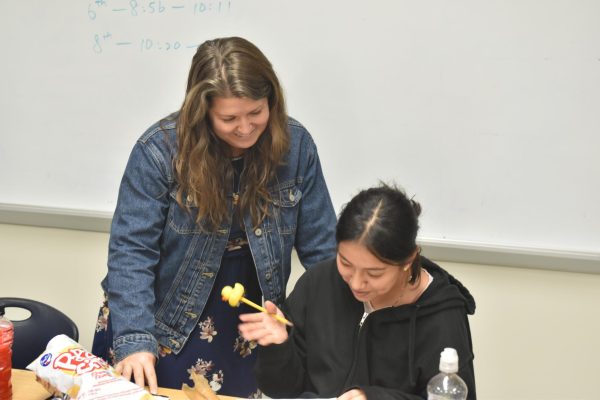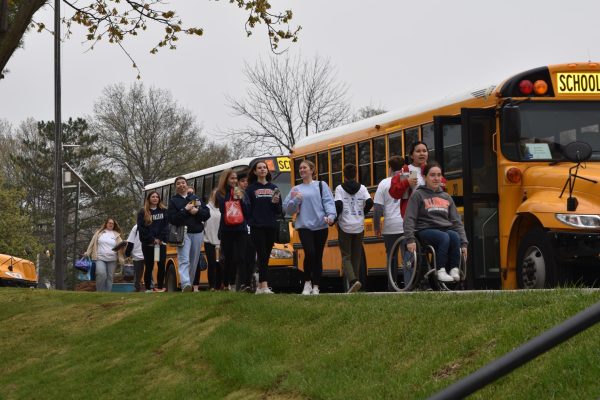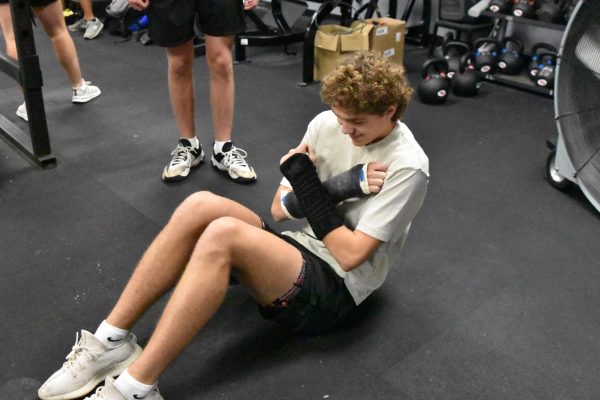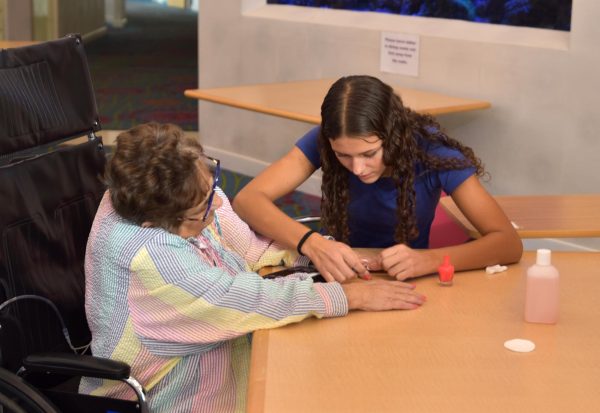Students, teachers comment on e-learning
Junior Paige Kehlenbrink works on her e-learning in her bedroom.
By far the craziest thing about 2020 thus far for students and teachers is e-learning.
Lily Stark and Nicholas Jumps, sophomores, are examples of people who have had differing experiences with e-learning.
“Considering I’ve taken online classes in the past for summer school, I’ve had a little experience with online classes. So this helps make e-learning a lot easier. Even without that experience, online school still would’ve been pretty easy for me,” Jumps said.
Stark, on the other hand, has had more of a negative experience with online schooling.
“I would say it’s easier to focus at school. Even though I go to the South part time and have experience schooling at home, I’m the kind of person who needs structure and physical demonstrations in a subject in order to fully grasp the topic. So, it’s harder for me to focus at home due to less structure and more flexibility and distractions,” Stark said.
The transition to online classes hasn’t just been hard for students, but for teachers, too. Science teacher Justin Flack said transitioning to e-learning was difficult, at first.
“I was stressed a lot at first, but now not as much. I have found a groove and a pace that seems to suit me,” Flack said. “There is a lot more prep-work. Once I have everything done on my end and sent out, most of it is on the students to do the work and contact me if they have questions. The pace is a little slower than it would have been in class, but not too much.”
Teachers have been giving different amounts of work depending on the class, but the district has set a limit for teachers that they aren’t supposed to be assigning more than 90 minutes of work per week for their class. In addition, e-learning can only count for 5 percent of a student’s grade, and students have the option to make up any assignment they did before Spring Break if they ask the teacher. Flack said he believes each teacher only giving 90 minutes of work per week is understandable.
“For this unique situation, I feel that this is probably appropriate. If this was a normal e-learning class that a student had elected to take to replace an actual class, I would expect them to put in a lot more work and of course, their grades would be a lot more impacted,” he said.
Science teacher Jennifer Berger said she believes that the district should allow teachers to give out more than 90 minutes of work per week.
“The district is currently recommending 90 minutes of week per class. That is not nearly enough time to teach the curriculum, so I would say longer,” she said.
As stated before online schooling is only worth 5% of a students grade and can lead to apathy and no motivation to do work.
However, Stark said she still thinks e-learning is necessary.
“I don’t feel like e-learning is pointless because it’s a way that teachers are able to still prepare us for next year with materials and exercises,” she said. “We are able to also learn good time management techniques through e-learning and it helps us to continue practicing skills that we need for next year.”
Jumps agrees.
“Although I feel e-learning won’t impact my grades much, I still feel the work we’re doing is important. A majority of the classes were to help all of us in the future in some shape or form. I feel that they should be taken seriously in order to take care of ourselves for the near future,” he said.
Teachers also have their own opinions about how the work they’re giving out online is only worth 5 percent.
“It is understandable why they made the decision. They had to consider all of the situations of students and they defaulted to the lowest situation,” Flack said. “As a teacher, I feel I am putting in a lot of work to get things available for students. To have them only with 5% of their grade feels like it is belittling the amount of work that I am putting in.”
“While I understand that this is a difficult time for many people, I do not think that 5% is enough of a value to encourage students to stay engaged in their education,” Berger said.
Teacher-student contact has always been a big part of helping students stay engaged. According to some teachers there has been a decrease in this contact during e-learning.
“Just by the sheer nature of the online experience, students are definitely in less contact than in a classroom. In a classroom, students are more likely to ask a small or clarifying question, then they are to take the time to type an email or get on zoom to ask. Also, just in general, the interaction has gone way down with e-learning. The first couple of weeks had pretty good contact but last week, it was pretty scarce,” Flack says.
Berger believes that teacher-student contact is more about who the student is.
“That depends on the student. I have some students that I hear from more, and some that I haven’t heard from at all,” Berger says.
Student apathy isn’t the only problem schools have faced. Parkway along with many other schools have tried to alleviate the problem some students might face with not having adequate technology for e-learning. The district has lent out Chromebooks to any students who needed one, and provided free internet hotspots for students who don’t have internet in their homes.
Jumps said he believes Parkway is doing the best it can under the circumstances.
“I don’t feel we have any more effective learning solution for alternate learning than what we’re doing now. There may be a better solution, but it’s hard to accomodate for everyone and find the most effective solution. Currently, I feel this is the best we have,” he said.
Stark agrees with Jumps but thinks that contingencies should be made now.
“I mean I think most schools have provided school supplies needed such as chromebooks, but for the schools that haven’t I think there should be a funding program in place for future emergencies. We should fund money for school supplies, meals, and other essentials for students when something like this happens again,” she said.
Stark believes that E-Learning made us all learn something about ourselves.
“I think E-Learning can teach students how to prepare for the future, manage time well, and study independently. I think for teachers, it can teach them how to prepare material online and how to organize and prepare students for the future (time management skills and studying independently). I think those students can choose whether or not to push off an assignment until the very end. But, I think that it is a very essential skill to have,” she said.


